Submitted by David Potter
This was a busy year for the Committee in its new instantiation. The committee’s principal accomplishments were the posting and publication of the panel on alternative careers that the committee sponsored last year. The panel was largely organized by Betsey Robinson and Mike Lippman, and they helped a great deal in getting the final material pulled together. Response to the panel was extremely positive and it might be a good idea to see if it is something that can be repeated, though cost is plainly an issue (the University of Michigan contributed $7000.00 to the enterprise).
The committee as a whole remained concerned about the impact of the new AIA service on placement. We are pleased to note that the overwhelming majority of institutions advertising positions did so through the APA Placement service, and that the overall number of positions advertised was higher this year than in recent years. One operational issue that arose concerned the appropriate response to an institution that advertised a position, then re-advertised the position seeking a completely different set of credentials (the position in question was first posted for a scholar working in Late Antiquity, then for a Classical Philosopher). The matter was discussed at the Placement Committee’s meeting. At that time the committee considered three options:
- No action
- Requiring that the institution pay for a second ad
- Referring such matters in the future to the Placement Committee which would decide if payment for a second ad would be justified.
In this case the institution, which had not recently used the placement service indicated that it was simply concerned by a small applicant pool and had contacted the original applicants to indicate that they were simply trying to expand the pool. The Committee recommends that such issues, in the future, be referred to the Placement Committee as a whole to determine if the institution should be required to pay for a second ad. There was also an issue with a History Department that used the Placement Service to post a position then refused to register with the Placement Service to conduct the interviews. This is a recurring problem with History Departments. The committee did not discuss the issue, and it may be that the situation is intractable.
The Placement Committee initiated a web survey of institutional satisfaction with the service, which was carried out by Professor Brady West and Ms. Dan Li at the Institute of Social Research at the University of Michigan. The survey asked institution that had used the service in the last five years to rate their experience and then to answer a series of further questions about placement issues. I strongly recommend that this survey be repeated on an annual basis.
The responses to the survey were generally encouraging, showing increasing satisfaction with the operation of the Placement Service, especially after the introduction of the new on-line system. We also note that there has been a general move on the part of interviewing institutions towards the use of rented suites and away from “alternative methods.” The decline in the latter is particularly gratifying. The issue raised in Question 5 does require some attention as institutions do not feel that the new system has made it easier to schedule interviews. While there is a better than 70% satisfaction rate for 2012 and 2013, the satisfaction rate under the old system was better than 80% in 2009 and 2011.
The written comments included the following observations in response to the question about whether the new system was easy to use indicated some discomfort with what as felt to be the inflexibility of the system:
- The system is too rigid and does not allow for flexibility in needs
- The first year of the online functionality was a mess
- I don't think the glitches have been fully worked out yet; I assume once they have been that the online system will be easier to use than the paper submissions.
The majority of responses were more positive, with the following examples being typical:
- Clearer, more efficient
- It made it much easier to submit and check information It was just so much more flexible, clear, and responsive than the old paper way.
The overall impression from the survey is that institutions are generally pleased with the way that the system has worked for them.
There were extensive written comments in response to the question of whether departments would prefer to schedule their own interviews. The overwhelming impression from these responses is that institutions prefer to have the Placement service schedule interviews. Typical responses are as follows (for the full tabulation see appendix 2):
- I do NOT think it is appropriate for interviews to be scheduled directly. See above story. What if someone needs an interview at a certain time but does not want to say why because it would mean revealing potentially damaging information? I like the fact that Renie can be an intermediary in the process. From the perspective of my institution, I also do NOT want to know if a candidate has ten interviews or one--something that might easily come up if I'm scheduling the time directly with the candidate
- I don't have a very strong preference; it just seems like it would probably be easier for the candidates if the scheduling process were centralized
- I have no desire to deal with all the details of matching schedules. If you can take that off my hands, I'm grateful
- I think it is easier for the service to balance the requests of the committees and the schedules of the candidates than for every committee to schedule on its own. It would be difficult, I think (and possibly give the committees too much information?), for the candidates to have to say "I can't meet at that time because I have another interview then or right before/after that." Although it was difficult to come up with twice the number of slots as candidates, it is fairer to both committee and candidates t have the centralized scheduling
- I work in a foreign languages department so I've also experienced the MLA model where search committees and candidates do their own scheduling, and it seems to create more confusion and hassle than the APA model
The question regarding the use of Skype as opposed to in-person interviews one garnered a great deal of attention. In general terms the following responses sum up the general tenor of the responses, which are tabulated in Appendix 3:
- We only use Skype when the person has good reasons for being unavailable at the APA. We dislike it strongly: it is hard for the candidate to get a proper sense of the room and how his/her responses are being received by all the members of the committee, which in turn can mean that they perform below their best. Moreover, Skype is difficult for people who have hearing problems, and at least one of our faculty (plus an unknown number of candidates) is in that position
- We have used Skype if the person was out of the country during the annual meetings. It is helpful as a back-up, and seems useful from a budget point of view, but it is not the equivalent of an in-person interview with the search committee. We would use Skype for candidates who could not attend the meeting. Skype is not as good as in-person interviews, but better than interviews by telephone
- Skype is confusing if the search committee is large and needs to rotate to be in view. I've done Skype once (not in a classics search) and not found that problem insuperable. Big advantage when (1) there is some incentive to push the second cut earlier in the season -- APA meeting in January is pretty late; or (2) the meeting is in Seattle and candidates from the East don't want to invest in attending. There are lots of disadvantages to having only an image rather than the whole person, but we always interview finalists on campus and in cutting to three or four finalists Skype has mainly advantages
- Possibly due to distance and associated issues which may prevent a strong candidate from attending the APA meeting. Using Skype in video mode is preferable to a voice only interview, but it still does not compare to a face to face interview
- If the position were non tenure-track, such as a one-year visiting position or the like. The disadvantages to using Skype are that the candidate has no sense of the faculty that he/she is interviewing with. Even with a good connection, it's hard to hear everybody clearly. In short, there is no substitution for an in person interview when the stakes are high.
The Committee recognizes that Institutions face significant cost constraints and are under pressure to look to Skype interviews in place of in-person interviews, but the general feeling of the committee was that in-person interviews are an extremely important feature of the hiring process. The Committee recommends that the APA develop guidelines or a list of best practices for the use of Skype interviews that members can use as a resource in discussions with their home-institutions in setting up their search processes. It was noted that Classics Programs housed within other units (e.g. Romance Language Departments) can face especial challenges in getting the resources they need.
In closing I should say that the APA staff has been consistently supportive of the activities of the Placement Committee and that I am grateful for Adam’s careful attention to issues that have arisen in the past year.
Appendix 1: Questions 1-8 responses
1. 1a. Did you purchase Comprehensive Service for Institutions from the APA/AIA Placement Service at the XXXX annual meetings in XX? /Percentage of Yes
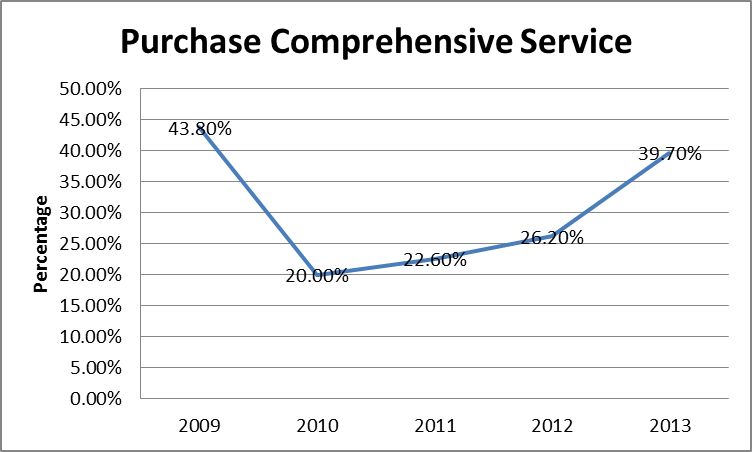
2. If you conducted interviews in XXXX, did you do so…

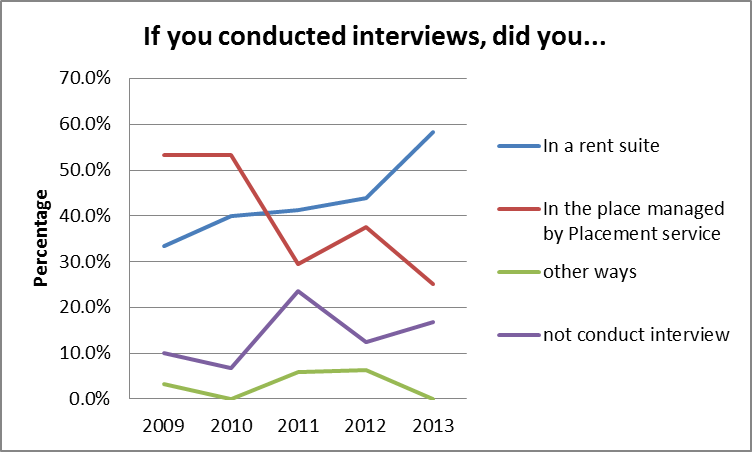
3. Please indicate below your agreement or disagreement with the following statement: It was easy to place an advertisement with the Placement Service in XXXX.

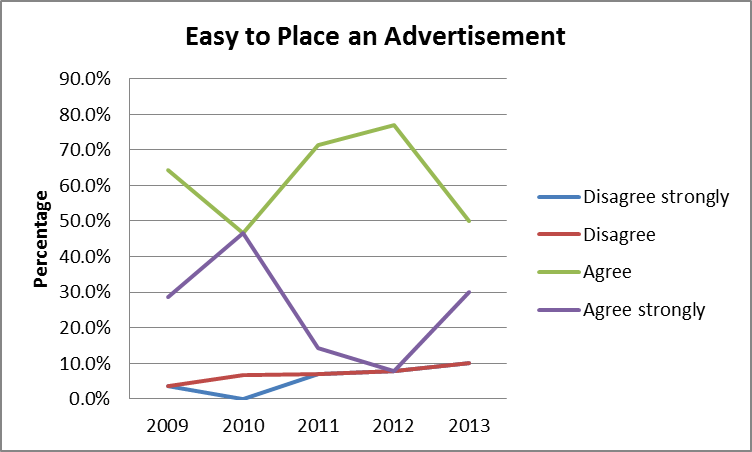
5. Please indicate below your agreement or disagreement with the following statement: It was easy to submit the names of candidates we wanted to interview and the times when our search committee was available in XXXX.

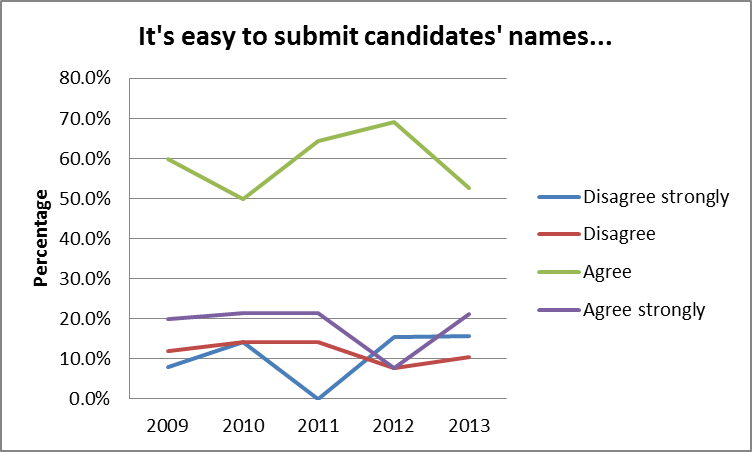
7. Did you encounter any logistical difficulties in conducting your interviews at the annual meeting in XXXX? /Percentage of yes
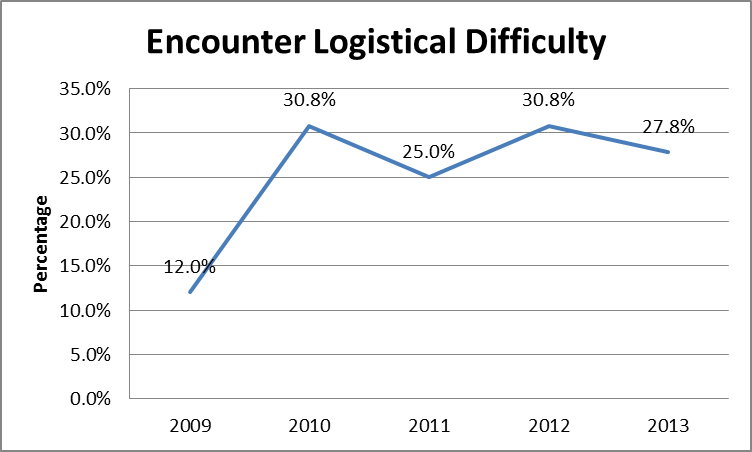
8. Were the issues resolved to your satisfaction? /Percentage of Yes
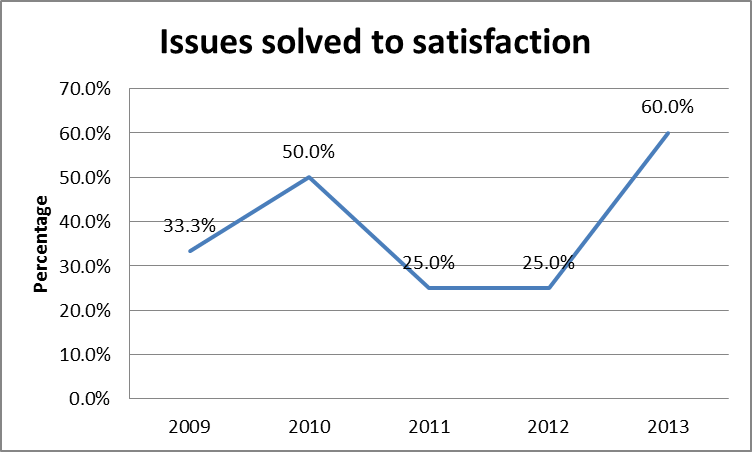
Appendix 2: Reponses to question 13: Please give reasons for your preference. (would you prefer to schedule your own interviews at the annual meeting directly with candidates?)
|
APA/AIA scheduling seems to be more efficient. |
|
Because it did not seem that the placement service personnel could do the job effectively, we may as well have done it ourselves. |
|
Chaos would ensue and it would be too much work. |
|
Easier to coordinate our own schedule. |
|
Everything ran smoothly. |
|
Having the Placement Service handle the scheduling removes the onus of individual scheduling from our institution and reduces the chances of our making scheduling errors. |
|
I assume a central and synoptic system for coordinating so many candidates and (not) so many schools has major benefits in efficiency; and perhaps more important, it certainly saves both parties (esp. interviewees) time and anxiety. While I can imagine some benefits in greater flexibility if individuals have a role, I suspect those would be more often outweighed by nuisance of juggling and shifting schedules. |
|
I do NOT think it is appropriate for interviews to be scheduled directly. See above story. What if someone needs an interview at a certain time but does not want to say why because it would mean revealing potentially damaging information? I like the fact that Renie can be an intermediary in the process. From the perspective of my institution, I also do NOT want to know if a candidate has ten interviews or one--something that might easily come up if I'm scheduling the time directly with the candidate. |
|
I don't have a very strong preference; it just seems like it would probably be easier for the candidates if the scheduling process were centralized. |
|
I have no desire to deal with all the details of matching schedules. If you can take that off my hands, I'm grateful. |
|
I prefer paying the staff to coordinate the schedules of the candidates and the interviewing team. Too many loose ends can fray the cloth. |
|
I recognize that the candidates will need to coordinate with multiple parties, and it seems easiest to allow one party with a comprehensive view to make the schedule. |
|
I think it is easier for the service to balance the requests of the committees and the schedules of the candidates than for every committee to schedule on its own. It would be difficult, I think (and possibly give the committees too much information?), for the candidates to have to say "I can't meet at that time because I have another interview then or right before/after that." Although it was difficult to come up with twice the number of slots as candidates, it is fairer to both committee and candidates t have the centralized scheduling. |
|
I think there are great advantages to candidates especially for a centralized scheduling service, with interviews all taking place in one general location, with a standard time (30 minutes) for each interview. |
|
I work in a foreign languages department so I've also experienced the MLA model where search committees and candidates do their own scheduling, and it seems to create more confusion and hassle than the APA model. |
|
I'm doubtful about the viability of coordination between interview times and spaces. There's already a problem with the APA doing both. Without many more available spaces I'm not clear how the proposed change would work. |
|
If a candidate were only interviewing with us, then it would be easier to arrange things directly. But candidates are often trying to arrange things with multiple institutions, so having the process centralized makes more sense to us. |
|
If the APA does it, it is easier to make sure the candidates have no conflicts. |
|
It is certainly easier for one organization, who has access to candidates' and interviewers' schedules to work out the interviews than to have us all do this ad-hoc. That would be total chaos. |
|
It is easier that scheduling be conducted centrally because of the complexity of the schedules of both the candidates and the SCs. |
|
It is much easier to set up things well in advance of the meetings. |
|
It is not so easy to send a bunch of emails back and forth to coordinate with candidates' schedules. |
|
It seems more efficient. |
|
It sounds like a nightmare to have to contact each person and coordinate when they are available during the meeting. Plus that is added responsibility on me and I wont get paid an extra $400 for taking it on. |
|
It was quite helpful to have the scheduling done - we just weren't used to the system since this was the first time our institution had interviewed at AIA/APA |
|
It would be a pain in the neck. What do you the pay the fee for? |
|
It's easier for all concerned when the APA does the scheduling. |
|
It's easy to have you do it. (Although we schedule our own for all other searches. |
|
It's much easier for the Placement to schedule the interviews than for us to communicate with each candidate individually. |
|
Logistically it would be a nightmare to try to arrange so many interviews on our own. |
|
More efficient. |
|
On the assumption that institutions are operating in good faith and fairly, it needs to be understood that selecting a roster of candidates by a search committee is an inexact science, and that within any pool some candidates will bring different qualities to the interview than others. If search committees, working in good faith, etc., have some control over the process, candidates can be placed in circumstances where their skills or deficiencies are more clearly shown. |
|
Scheduling on our own just seems likely to create too many potential conflicts for the candidates. |
|
See answers above. |
|
Sounds like each institution going it alone would cause a lot of chaos. |
|
The current system seemed to work fine, and it allowed us to focus on other matters. |
|
The placement service functions efficiently and I found no difficulty working with the staff. |
|
the system worked for us |
|
The system worked well enough for us. |
|
Too complicated to manage. |
|
too much work for us. |
|
Trying to arrange times with candidates and then with the Placement Service would add an extra layer to negotiate in arranging times; this could only complicate things. |
|
Using the APA service is more convenient for candidates and less work for our office. |
|
Using the Service to schedule interviews, and doing the interviews in Service public space, seems antiquated now, in the IPhone era. It's so easy now to stay in touch with candidates and to arrange times and places directly. |
|
Usually have had satisfactory meeting times arranged by the Service, even with not a lot of flexibility given by us. |
|
We like to contact candidates by phone and speak to them personally--it's an introductory interview of sorts. We can also tell them where to find out more about our program. Then we can agree on a time. We still need the APA to help us find interview space. |
|
we like to use a centralized service. why would we want to do all that work ourselves? candidates need central coordination. |
|
We would control the times, the process, and there would be less confusion |
|
we're pleased to avoid this task. |
Appendix 3: Responses to Question 14: Under what circumstances would you substitute a Skype interview for an interview in person? What advantages and disadvantages do you see in using Skype?
|
-When the person can't physically make it to the meeting. -Spotty quality of reception. |
|
A Skype interview allows for great reduction in travel costs. We don't necessarily need to send the entire interviewing team to the convention. However, despite our best efforts, a Skype interview still effects an intervention into real interaction. I would not like to see final interviews done via Skype, but the creation of a short list seems like a viable goal for use of the technology. |
|
Advantage is clearly cost. Disadvantage: Skype seems to me to work best one-on-one. We have discussed using Skype to narrow the list of candidates but not as a replacement tout court. |
|
Candidacies can stand or fall on an interview. In every way, interviewing someone in person reveals more about their personality (presence, charm, ability to communicate). Skype interviews are a different genre, which tells you only how a person comes across on screen. I'd suggest that type of interview mainly for institutions that plan to use the candidate for online learning and MOOCS. |
|
Difficulties for preferred candidates to attend conference(s). Disadvantage: some candidates are manifestly ill at ease using skype (so are some of the faculty). More experience using Skype will ameliorate such issues. |
|
dire financial constraints. Skype with strangers makes for an artificial experience. |
|
Financial exigencies are the only reason to substitute Skype for the real thing. Much gets lost (atmospherics, body language, etc.). |
|
for a one year job, or one that is approved too late to interview at the convention advantage: more home faculty can participate disadvantage: interviewers are more focused on the task at the convention |
|
For a visiting position in the Spring |
|
I do not like skype interviews. |
|
I do not think Skype interviews are good substitutes for in person interviews but realize that they may be forced upon us for economic reasons. |
|
I have used Skype conference interviews while serving on a search in another discipline. They are still quite helpful, although it can be fraught to depend on technology. It is helpful for interviewing candidates who cannot attend the meetings, including international candidates, and for including committee members who cannot attend meetings. |
|
I have used telephone interviews for postdoc positions, and my successor has used Skype for those interviews. I doubt that I would be confident about using either for regular faculty positions. But convenience and cost may outweigh the difficulty of making a judgment about people using that technology. |
|
I'd only use Skype for visiting positions not tenure-track posts. |
|
I'm not sure that we would do this. I guess if there were a candidate we thought was potentially perfect for the position but who couldn't be at the meeting, we would consider it. The disadvantages are great. In particular the interaction between interviewers and interviewee is stilted and two-dimensional. It's harder to get a sense of each other's personalities if the parties don't already know each other. |
|
If candidates were unable to come to the meetings or our department unable to send at least one representative to the meeting. Our preference would be meeting in person, but Skype is better than just a phone conversation. |
|
If someone we wanted to interview were unable to make it to the APA, we would Skype or phone interview instead. |
|
If the candidate couldn't come to the meetings. Disadvantages - face to face contact with all search committee members who are interviewing. |
|
If the candidate were located overseas (e.g., Europe, Asia, Australia). |
|
If the person was not coming to APA. Skype is no substitute for face to face contact. |
|
If the position were non tenure-track, such as a one-year visiting position or the like. The disadvantages to using Skype are that the candidate has no sense of the faculty that he/she is interviewing with. Even with a good connection, it's hard to hear everybody clearly. In short, there is no substitution for an in person interview when the stakes are high. |
|
In a search late in the year only. Skype is only better than a telephone, not better than in the flesh. |
|
International candidates (perhaps). The technology is still a bit wobbly. |
|
Medical condition of candidate or other special circumstances. Skype does not replace being in the same room with someone, when trying to gauge collegiality and non-verbal communication (so important for teaching). |
|
More cost-effective, meet more candidates. Perhaps less effective in gauging personalities. |
|
never |
|
Never anything but in person, face to face in the same room. |
|
Only if an emergency prevented candidates or faculties from reaching the conference. It's just not personal enough. |
|
Only if an in-person interview were impossible. Skype is awkward, often has a sound delay, and makes it impossible to see everyone (on the interview committee) as one is speaking. |
|
Only if I couldn't interview in person. The only advantage of Skype is cost. I dislike the medium extremely. |
|
Only if the candidate for extraordinary reasons could not make a personal interview. Skype is at least one step removed from reality. |
|
Only if the candidate were unable to attend the meeting of the APA for some good reason. Skype is not always ideal because of poor connections, delays in reception, etc. |
|
only if the person could not come to the meetings; skype does not allow any real contact; I have only once in quite a long career seen a skyped interviewee get a campus interview. |
|
Only if the person really couldn't make it in person, or if part of the cmte couldn't make it to the meetings. For a one-year job, Skype is fine. |
|
Possibly due to distance and associated issues which may prevent a strong candidate from attending the APA meeting. Using Skype in video mode is preferable to a voice only interview, but it still does not compare to a face to face interview. |
|
Skype interviews work best for temporary, leave-replacement positions. We tend to wait for the dust from tenure-track positions to settle and then proceed to do Skype interviews. I have used Skype interviewing for the other department I am associated with and it worked great. |
|
Skype interviews would be useful if there was a candidate we wanted to interview, and either they or we could not get to the annual meeting. We would also use skype interviews for late searches conducted about the annual meetings. |
|
Skype is confusing if the search committee is large and needs to rotate to be in view. I've done Skype once (not in a classics search) and not found that problem insuperable. Big advantage when (1) there is some incentive to push the second cut earlier in the season -- APA meeting in January is pretty late; or (2) the meeting is in Seattle and candidates from the East don't want to invest in attending. There are lots of disadvantages to having only an image rather than the whole person, but we always interview finalists on campus and in cutting to three or four finalists Skype has mainly advantages. |
|
Skype is still not very dependable, nor are most people set up with a wide-angle camera to get a whole committee in at once. We do skype interviews for late-arising, temporary positions. |
|
Skype might be useful for a preliminary interview if we were searching for a temporary position and could NOT attend the meeting. But in general Skype does not provide the kind of personal contact that helps us determine the intangibles of a candidate. |
|
The skype interviews we did were a failure. It gave a false impression of the candidate. |
|
Unfortunately, our institution has a new policy that all visiting assistant positions will now be done by phone or Skype. We will only be interviewing at the meeting in the future when we have a tenure-track position available. |
|
We already do this when candidates do not attend, for whatever reason, and we would probably do it for late postings. But our experience suggests that face-to-face promotes richer interaction and so fuller interviewing, and seemingly a more congenial ambiance for candidates. It also restricts opportunities for following up with candidates on site. |
|
We did Skype interviews last spring when we interviewed for a short-term job at CAMWS and not all our candidates were going to be at the conference. It was fine, but vulnerable to glitches if the wi-fi was insufficiently powerful. |
|
We have used skype for short term positions. Skype is unreliable (connections can be awful) and does not give a good feel for the persons. We would never use it for a full time tt position. |
|
We have used skype if the person was out of the country during the annual meetings. It is helpful as a back-up, and seems useful from a budget point of view, but it is not the equivalent of an in-person interview with the search committee |
|
We only use Skype when the person has good reasons for being unavailable at the APA. We dislike it strongly: it is hard for the candidate to get a proper sense of the room and how his/her responses are being received by all the members of the committee, which in turn can mean that they perform below their best. Moreover, Skype is difficult for people who have hearing problems, and at least one of our faculty (plus an unknown number of candidates) is in that position. |
|
We prefer in-person interviews if at all possible. But we are very willing to do Skype interviews if candidates have too great of conflicts, or for some reason cannot attend the meeting. |
|
We would substitute Skype if a strong candidate could not make the meeting. I think in-person interviews are far superior. In Skype there is too much visual focus on the candidate. |
|
We would use a Skype interview only as a last resort because live, face-to-face interviews are more effective and less awkward. |
|
We would use Skype for candidates who could not attend the meeting. Skype is not as good as in-person interviews, but better than interviews by telephone. |
|
When the candidate cannot come to the convention we use Skype as a substitute. It is more awkward than meeting in person, but it seems to be a reasonable substitute. |
|
When the person we want to interview is at the annual meeting of another organization or not able to come to the US from abroad. The disadvantage of Skype is that it freezes up a lot and does not allow for a very comfortable interview. The advantage of Skype is that it could make the annual meeting redundant and save departments and candidates a lot of money. |
